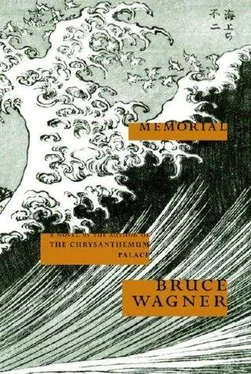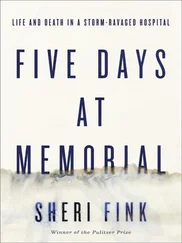She deleted the Larry s and switched to the 24 hour Health Channel. It was right at the beginning of one of those Medical Incredible s, a segment about a woman in her early 30s with a one-in-a-million reaction to a common antibiotic. Within 12 hours of taking a bitsy pill, she’d “sloughed” 100 % of her skin. As Mom and friends spoke on voiceover, there were shots of her in a medically induced coma, patented cellophane-like sheets of bioengineered dermis made from shark cartilage and cow tendons stapled to her body as a protective sheath. Joan couldn’t believe what she was seeing; she felt like Liv Ullmann in Persona, cowering in front of the psych ward TV watching a monk set himself on fire. Toward the end of the hour, her doctor said that around Christmas there was a ray of hope — a tiny patch of skin began to “recolonize.” The woman made her dramatic camera debut at the end. She was kind of Goth, kind of Echo Parky, a little overweight but eerily luminous, as if lit by a Tim Burton lantern she’d swallowed. She visited the ICU, hugging everyone who had taken care of her. She told the camera that her skin was now like a baby’s, tissue thin, and she had to walk under a parasol for the next few years when out in the sun. The doctors said she wouldn’t begin to wrinkle until she was in her late 60s, and that was when Joan lost it.
How exquisite.
She cried and cried and cried.
HE left the hospital.
Ray’s lawyer sent a Town Car. The old man was nonplussed, but Big Gulp ate it up from the backseat. She looked lovely. She wore a turquoise sari, hair in dark plaits. BG had a goofy, toothy grin; if the city wound up giving him a little money, maybe he’d have em straightened.
THEY met barely a year ago on the Santa Monica pier. Early morning, chilly weekday. He’d gone there to fish just like he used to decades ago, when his marriage was in trouble. She stood on the far end, staring off. He thought she was a jumper. He struck up a conversation — he was so old, he figured that would be the only reason she’d talk because she looked shy and skittish by nature. (It took months before she showed her ballbusting side.) They spoke of fish. She used to sell it, she said, at market in Calcutta. He couldn’t make the words out very well. Thick accent; low, furtive tones. Something about mustard seeds and how she’d worked as a nanny. How she wound up doing the same thing for the “CG”—the Indians liked their acronyms — the consul general in San Francisco. It was tortuous but he finally understood: she took care of some kind of ambassador’s kids. Ran away. Didn’t explain further. Ray (at 1st she thought his name was Raj) asked if she was a “wanted woman” but he didn’t think she got the joke, which probably wasn’t so funny and was even maybe true, and that she might have misinterpreted his comment as lurid. She said she had to go and he told her he’d be there the next day, same time. He hadn’t planned on saying it, nor the subsequent possibility of her reappearing, and as the words came out he suddenly half dreaded the thought of getting up early and driving all the way from Industry (where he’d just moved after pulling up stakes in Mar Vista) for nothing. But lo and behold, she showed up 25 hours later, wearing the same clothes as before. She looked hungry. “I don’t feel like fishing,” he said. “Let’s get some breakfast.” After some of that trademark headbobbling and balking, she finally agreed.
When they got to the car she became hesitant. She saw the Friar and was afraid. Ray said the dog was fine and opened the door to let him pee, introducing Ghulpa as he wagged his tail and ignored her, and she patted his head, all the time with that nervous, tooth-packed grin. He put the dog back and suggested they walk to McDonald’s. (He was going to take her to Norm’s but that was 7 blocks away and Mickey D’s was just around the corner.) They had thin coffee and McBreakfasts and didn’t say much because he wanted her to feel at ease. Not that there was a whole lot to chat about. It was mostly subterranean.
He learned that she’d never married. Ghulpa looked around 42 but as Ray got older he had become a poor judge of age, especially a lady’s. He told her he married only once, a lifetime ago, with 2 kids he no longer knew. That puzzled her; how could that happen? He shook his head, saying he didn’t think he’d been “ready” to have a family. (It sounded cavalier though he didn’t mean it to.) He added that his wife was a “ballbuster” then thought, Now why did I say that? Ghulpa didn’t know the phrase and he laughed, relieved. He would choose his words more carefully now because he wanted to court her, not as a sexual being, but as a man in the September of his years who wanted a companion, a female companion, this female companion, dropped before him like a swarthy outmoded mermaid, without the baggage of a culture that he had exhausted and had exhausted him in return.
“I do regret not knowing them. The children.”
Now something in her seemed relieved; that he’d taken her question seriously, and considered it, like a serious man. Ray saw how sorrow wasn’t foreign to her and drew comfort from her demeanor during his confessions. They both exhaled.
“I wonder about that every day — wonder how I let that…But you get to be my age and there’s a lot of water under the bridge you can’t quite explain.” He wondered if she knew what he meant. He’d muffed it anyway. “I guess as time goes by and you get closer to your Maker, you become all right with it. You don’t have much choice. You try to forgive and be forgiven. Jesus, I sound like a fundamentalist. You pray for that. To live and let live. You try to let go of things too.” The platitudes somehow felt right. Longitudes and platitudes. “You feel pretty bad but with time you become all right with it, and all right with God. At least you hope you do.”
Ghulpa smiled, lips closed over buckteeth to disarming coy effect, because she saw the 2 of them were alike — in some ways.
“How old are you?”
“A man never tells.”
“60?”
“Well now I wish!”
His heart fairly fluttered, and that had been a while.
“58?”
Ray’s eyes twinkled at the sweet con. There was an innocence about her that was inviolate.
“You’re good, Ghulpa. You’re very good. And you’re a helluva nice lady.”
Pleased as punch, he was.
WHEN the Town Car pulled up to the apartment complex, the ancient landlord stood there holding a bouquet of 7-Eleven — bought flowers, because she liked the tenant in 203B, and knew that soon the City of Industry would be giving him booty with which he might be generous.
CHESTER and Laxmi were on their way to the empty clinic to meet with the landlord about renting it for the shoot. Maurie was the one who suggested she keep his friend company, and Chess was glad. He was out-of-control attracted to her and had the feeling Maurie knew it. Chess thought, Maybe he’s being kind or maybe he’s just perving.
Laxmi was around 27. Her hippie parents were divorced and her dad lived in Pune. He was a failed Jewish poet who’d hung with Ginsberg during the latter’s early 60s Benares sojourns; a pretty boy, almost a generation younger than the Beat Buddha, and Laxmi said that she was never able to confirm if “they’d gotten it on.” He headed a big company now, the usual software collective — he was “way ahead of the outsourcing curve,” she said — having lived in India on and off for 40 years. Even though he was a successful businessman, he was a “renunciate, in his own way.” Chess asked what that meant and she said her father was a sanyasi, that he meditated and that Ganesh was “his personal adviser.” (It all sounded seriously fucked up, but Chess was entranced. He knew about Ganesh from storybooks Mom used to read from but Laxmi made the elephant-headed god sound like some mobster-guru.) Laxmi’s father was rich but never gave her money, instead offering to pay her way any time she wanted to come to Pune, something she planned to take him up on one day. She said her name had been given her because Laxmi was the goddess of good fortune. “Meaning, money. Dad is a Jew to his teeth.” She said she would rather have been named Padma (her supposed middlename), which meant lotus, and asked Chess if he’d ever read something called the Lotus Sutra. He shook his head. “ ‘Suppose there was a wealthy man,’ ” she began to quote, “ ‘who had a magnificent house. This house was old, and ramshackle as well. The halls, though vast, were in precarious, perilous condition…’ ”
Читать дальше












